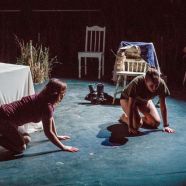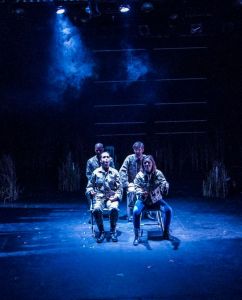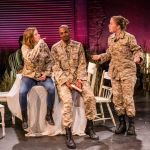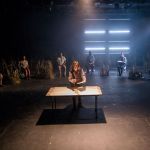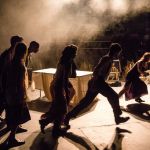Theater Is the Way I Deal With Things About Which I’m Totally Ignorant
My theater mentor is a depressive with a high-toed walk, an expressive stare, a love for dark jokes and old movies, and a deep, lifelong commitment to making theater. “Theater,” he told our class of high school actor wannabes, “is about observing human behavior.”
When I was seventeen, I was in the second play that changed my life at the Pennsylvania Governors’ School for the Arts; a now defunded, rather remarkable five weeks of art for high school students (free of charge! Thanks, Lyndon B. Johnson!) hosted in Erie, Pennsylvania. Remarkably, my mentor managed to build an original show with us in only fourteen days starting with a simple question: What’s concerning you? For two hours that first rehearsal we sat cross-legged on the stage—a fifty-year-old man and a bunch of teenagers talking seriously, as he took notes on our ramblings. We gabbed about very teenager-y concerns, but some deeper questions too: the Columbine school shooting had taken place a few months before, which sparked fear among us about the safety of our school places. It was a new time. We eventually made a twenty-minute work that combined scenes from our real high school lives and the diary of Anne Frank. It was glorious being part of that—not an old dusty version of an Agatha Christie or Thornton Wilder or whatever, but a real, living, breathing performance organism that spoke to us about our things.
“Here,” my mentor seemed to say, “use this. When you don’t know about something, study it. Turn it 360 degrees. Get to know the thing you don’t know by making it come alive onstage.” It’s still the best thing I know how to do.
Foreign to Myself
War plays have been popular since forever, and especially since 2001; the Iraq/Afghanistan conflicts are rich fodder for theaters around the country. In the last few years, I’ve read or seen a dozen shows about soldiers: desert soldiers, good-hearted soldiers, crazy soldiers, haunted soldiers, iambic pentameter soldiers (last summer I saw a version of Othello that set the entire play in an unnamed occupied desert country. Othello still died). Theater continues, despite its losing battle with movies, and especially television, to be good at “apocalyptic” and “stripped down”; double-edged skills.
So the theater company where I belong, Goat in the Road, found itself in the middle of making a war play called Foreign to Myself. Our company members were close to it—many of them had relatives who were knee-deep in these conflicts—and yet there were a series of questions we had to answer as the process progressed, nested inside of each other like Russian dolls:
Does anyone need another war play?
How do we approach Vets about their experiences?
Will they trust us to tell this story?
Wait, did we answer the first question, about needing another war play?
We didn’t? Oh, then should we answer that one first?
We’re already in rehearsal. How did that happen?
There are so many questions to be asked around military service in our society, and a huge swath of that experience civilians would rather not know about. We ask our service members to participate in something outside the bounds of normal “civil” life, and when they return home, the emotional gulf between war and home can feel almost insurmountable.
Our company was fortunate enough to start a working relationship with Gala True and Ray Facundo, two researchers examining how storytelling can help bridge that gap. Veterans coming home, even those who haven’t been in combat (most service members never see combat), have enormous difficulty in adapting to life once they get home: “Then you get out of the military and you try to integrate back—you do integrate back into the civilian world, but you quickly realize that nobody else is thinking that way, nobody else is thinking that everything they do is for a team” (“Warring Identities,” Smith and True, 2014). Or finding a stateside identity: “Combat Infantry Badge [CIB] is a great award because that means I did my job as an Infantryman. As an Infantryman I was engaged. I killed. And I destroyed the enemy [and] in the military that’s celebrated . . . you have certain clout in the military because you have the CIB. But when you come into the civilian life, I can’t wear that CIB on this sweater. Nobody cares” (Smith and True, 2014). This was a sentiment we heard over and over again in our two years of research and interviews: the skills learned in military service give a status and purpose that seems to almost evaporate at home.
Once we started working with True and Facundo, the play came into focus. With the generous input of therapists, researchers, and service members here in New Orleans, we realized that Foreign to Myself would be a show about the identity crisis that sometimes happens when vets return home. As civilians, we needed to make this play with other civilians in mind: How can we teach audiences something new about the veterans who are part of their lives? How can we teach ourselves?
On Monday, January 30, 2017, our crew of designers and performers, rehearsing in an empty music room at a local charter school (free of charge!), got a visit from OIF veteran Ariel David. We joked about this empty music room with the too-colorful carpet; one of our actors said that the busy-ness served to hide the boogers and snot holding it all together. Nervous laugh.
We had asked David to visit because she had generously offered to share her experiences as a weapons specialist in the Army, but she gave us a glimpse of an entire life. I’ve highlighted four of the notes we took that day:
-Women can’t be acknowledged in combat – defensive operators v combative operators, and the fact that she couldn’t be given a medal
-“You can’t separate the warrior from the war”
-Looking at service as something that colors/informs the rest of your life
-Does anyone come out of service not leaning strongly in one direction or another, in terms of still being dedicated to the military versus a pacifist?
-Mentioned vet whose stance was “it was my job, and I did it, and now it’s not my job anymore.”
-Image of having shot someone and then held them while they died
-“Two kids pointing guns at each other and all that matters is who’s going to pull the trigger first”
-Anecdote of woman thanking her for her service, and the woman coming up blank when Ariel asked her what she thought her service was. “No one ever has an answer to that.”
-Twin tropes as women in military being portrayed as either victims or disruptive
-Can never be just a soldier, pilot, etc – always a woman soldier, woman pilot, etc.
-Can assert yourself but you’ll either be a bitch, a dyke, or a slut
-Realizing that there is no monolithic military experience, and what’s actually monolithic is the upper tiers of the hierarchy, the older white male tier
-Image of being bored and very stoned, getting called out on a convoy and it just being a question of “who has the cocaine?”
-Anecdote about getting 5 speeding tickets when she came home because she just forgot about speed limits
I mean, holy shit. Ariel David had come out of the military to become an antiwar advocate, was always impeccably dressed (she told us that after being in the army she liked to dress as feminine as possible in civilian life), and now was researching vets and the effects of traumatic brain injury. But we also got something else from our conversation with David that deeply affected our approach to the material. We had a convoluted plot at the time, which involved a number of very long scenes where our main character gets angry whenever she calls the VA, gets angry at her family, gets angry at some dudes playing cards at a bar and beats them up. So much anger! Grrrrrr. It was all we knew how to write. Ariel revealed a true glimpse at the mundanity in the midst of these dramatic events. Sure, her time in the army was grueling and difficult, but it was also full of deep camaraderie and boredom and moments of “being bored and very stoned, getting called out on a convoy and it just being a question of ‘who has the cocaine’.”
Below is one of the scenes that eventually emerged from this conversation. Alex and Dobbs are female marines, trying to tell P-Moe what being a woman in the military is like for them. Rawls is a good friend.
(The theater gets dark – fog rolls in. Four people in uniform drive in a truck.)
ALEX:
How many firefights you been in P-Moe?
P-MOE:
Three.
ALEX:
Oh! What a coincidence. I have also been in three.
DOBBS:
And me as well.
How many combat action badges you have for that?
P-MOE:
Uh, three.
DOBBS:
I also have three! Oh wait…
I’m just now realizing I don’t have three.
P-MOE:
(He knows already)
Yeah yeah…
ALEX:
Really, why ever not?
DOBBS:
Because even though I was in the firefight no one is allowed to acknowledge I was in the firefight because I’m a WOMAN, and thus no combat action badges. For me.
ALEX:
So sad.
DOBBS:
Too bad.
David’s visit changed the thrust and complication of the play, bringing the world of overseas military service into sharp focus. The scene above is designed to show the close bonds created between soldiers as they go about their daily tasks, and also highlight the routine ways that women are discriminated against in military service.
Here’s the scene from above in performance:
More than anything, the visit humanized service and homecoming for us. Researching the play was a chance for us to ask individual veterans about their individual experiences and learn something about what civilians ask them to do, often without knowing it.
The old ways of coming home are long gone. Native Americans had a variety of rituals for “cleansing” warriors after battle before they returned to their family lives. The Greeks too: Euripides, Sophocles, and Aeschylus were writing plays about war for an audience of warriors, plays that examined the moral complexity of war actions versus home actions. And among veterans there is often discussion about the month-long sea voyage home for World War II soldiers, a trip that served as a transition time between the two worlds. But now you can be in a battlefield on Thursday and forty-eight hours later you’re at the movies in the Midwest with your family. It can be a little jarring. And more than that, it’s often hidden. As civilians we felt that we needed a healing ritual for ourselves, a ritual (in this case a play) that allowed us to commune with veterans, understand their stories, and to connect with the daily grind of coming home. It all continues to evolve, and our understanding of the material deepens as we plan to remount the show and make another stripped-down version for VA Medical Centers. I think the bigger questions about the greater good in all of this are slightly beyond me, but we plug on, trying to get to know better the thing we don’t know.
*All photographs of Foreign to Myself by Josh Brasted


